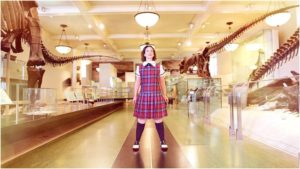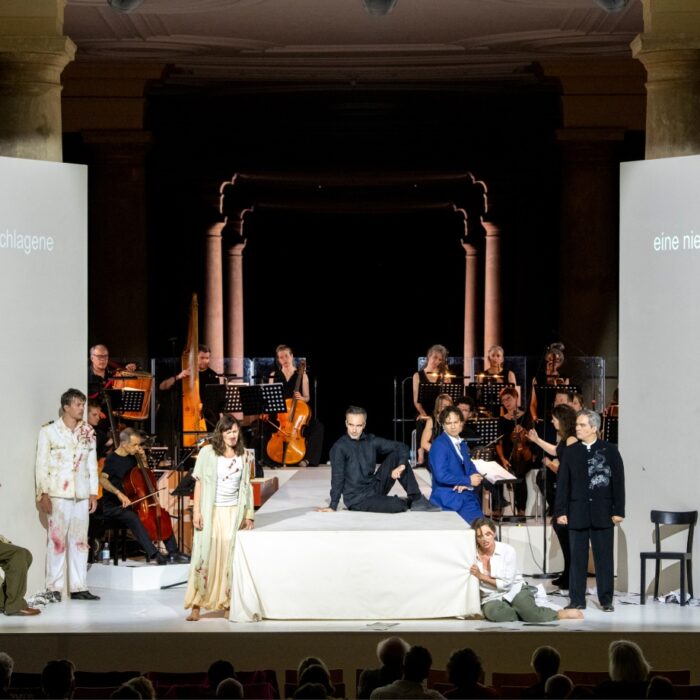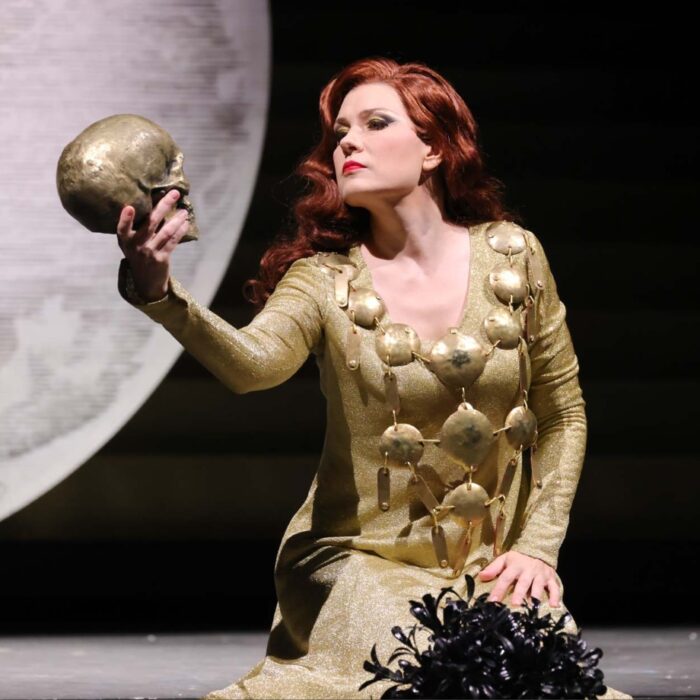
On Site Opera 2017 Review – Rhoda and the Fossil Hunt: A Fun Opera About the Imagination of Science
By Logan MartellIn the American Museum of Natural History’s Hall of Saurischian Dinosaurs, I took my seat along the edge of a display featuring the fossils of an enormous Apatosaurus waiting for the opening notes of “Rhoda and the Fossil Hunt.” On a platform beneath the tail of this behemoth emerged conductor Jorge Parodi and one part of the orchestra, the string section on the opposite end of the hall. As parents and bustling children filled the area sectioned off for the performance, I thought nothing of it when a small figure in stripes and a suspendered skirt brushed past me; with a vocal flourish that was undoubtedly operatic, this figure turned out to be none other than soprano Jennifer Zetlan in the role of eight-year-old Rhoda, whose energy caught the eyes and ears of all gathered.
From the libretto: “In the early 20th century, Dr. Henry Osborn, the then-President of the American Museum of Natural History, turned to painter Charles R. Knight to bring the Museum’s fossil collection to life for visitors. Through his paintings, Knight took viewers millions of years back in time to view dinosaurs as active, fast-moving creatures. Every weekend, Knight’s granddaughter, Rhoda, joined him at the Museum while he worked. While her grandfather painted in the Hall of Saurischian Dinosaurs, Rhoda watched in amazement as the massive fossils unpacked by the Museum’s paleontologists were transformed into living, breathing creatures on his canvases.”
The Opera
Being a half-hour opera, every minute was well-utilized as Rhoda’s task became clear: how to envision a dinosaur with only a handful of fossils. With encouragement to use her passion and imagination, given by her grandfather Charles R. Knight, played by sagely baritone Robert Orth, Rhoda was off in an instant to put the pieces together; the audience following in her wake quickly realized they were now part of the show.
No easy task for an eight-year-old, Rhoda’s whimsy and wonder was made all the more palpable by the music of famed composer John Musto. The score was light and airy before gravitas built alongside Rhoda’s confusion over how to depict the deinocheirus. The lyrics of librettist Eric Einhorn captured these feelings in a way the children could relate to all too well. Remembering the words of her grandfather, a burst of inspiration sent Rhoda sketching away in her book before she had in her hands her finished drawing, just in time to compare results with Knight’s painting.
As they discussed their methods, museum president Dr. Henry Osborn, played by tenor Patrick Cook, returned with exciting news sung with strong joviality: a complete deinocheirus skeleton had been unearthed, giving scientific validation to their works of imagination. Rhoda and Knight thanked the audience for their help before departing to relish in their success as well as ice cream, a fitting reward for any child’s hard work.
Imagination and Science
Among the themes was the relationship between science and imagination. This was present not only in the lyrics but in the costume choices as Knight sets to his work on the fossils not with microscopes or lab equipment, but by donning a painter’s smock and taking up his brushes. This approach to paleontology shows the discipline in a far more accessible light, one that children such as Rhoda can partake in by tapping into their abundant creative faculties. While we widely regard dinosaurs as being extinct, Knight reminds us that they live on to this day as birds. This connection provides a window from which we can learn about dinosaurs through the power of scientific inference.
More than a fun concept, I was impressed with how clear the singing came across over the excited murmuring of the parents and children, which was dense given the modest size of the hall. Though geared for a slightly different audience, this was an opera through and through, and it was skillfully handled by production company On Site Opera.
“Rhoda and the Fossil Hunt” will run Fridays and weekends from September 23rd through October 15th, after which the show will move to Chicago with production company Lyric Unlimited.


